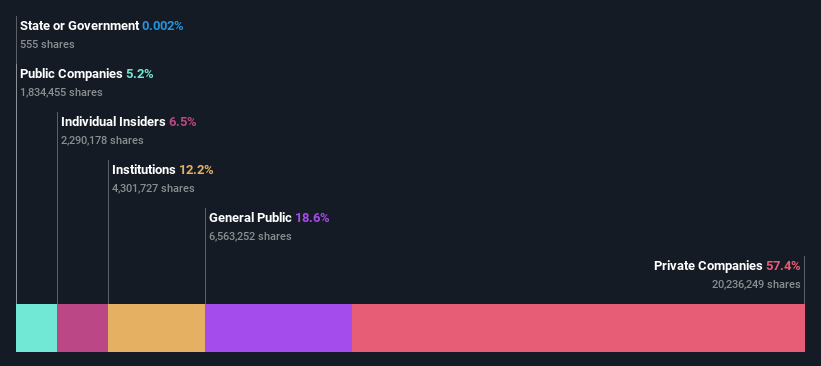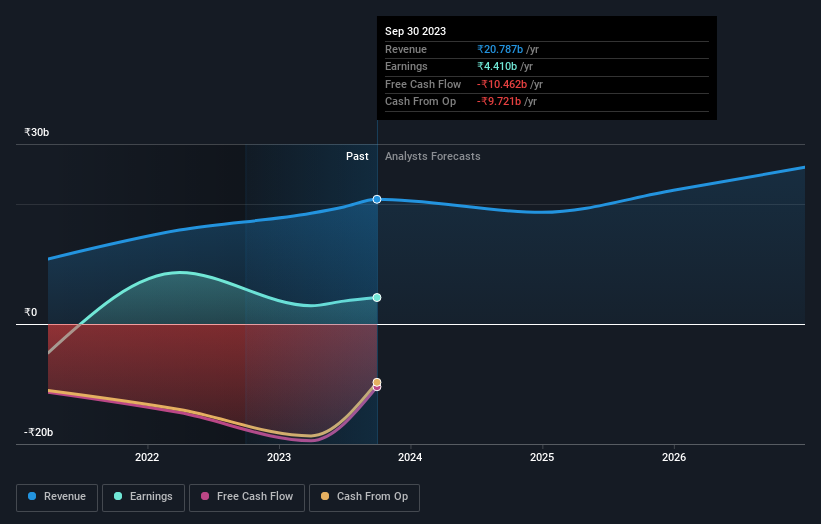- India
- /
- Capital Markets
- /
- NSEI:NUVAMA
Private companies among Nuvama Wealth Management Limited's (NSE:NUVAMA) largest stockholders and were hit after last week's 4.1% price drop

Key Insights
- The considerable ownership by private companies in Nuvama Wealth Management indicates that they collectively have a greater say in management and business strategy
- PAGAC Ecstasy Pte. Ltd. owns 55% of the company
- Institutions own 12% of Nuvama Wealth Management
To get a sense of who is truly in control of Nuvama Wealth Management Limited (NSE:NUVAMA), it is important to understand the ownership structure of the business. The group holding the most number of shares in the company, around 57% to be precise, is private companies. In other words, the group stands to gain the most (or lose the most) from their investment into the company.
As market cap fell to ₹122b last week, private companies would have faced the highest losses than any other shareholder groups of the company.
In the chart below, we zoom in on the different ownership groups of Nuvama Wealth Management.
View our latest analysis for Nuvama Wealth Management

What Does The Institutional Ownership Tell Us About Nuvama Wealth Management?
Institutions typically measure themselves against a benchmark when reporting to their own investors, so they often become more enthusiastic about a stock once it's included in a major index. We would expect most companies to have some institutions on the register, especially if they are growing.
We can see that Nuvama Wealth Management does have institutional investors; and they hold a good portion of the company's stock. This can indicate that the company has a certain degree of credibility in the investment community. However, it is best to be wary of relying on the supposed validation that comes with institutional investors. They too, get it wrong sometimes. It is not uncommon to see a big share price drop if two large institutional investors try to sell out of a stock at the same time. So it is worth checking the past earnings trajectory of Nuvama Wealth Management, (below). Of course, keep in mind that there are other factors to consider, too.

Nuvama Wealth Management is not owned by hedge funds. The company's largest shareholder is PAGAC Ecstasy Pte. Ltd., with ownership of 55%. This essentially means that they have extensive influence, if not outright control, over the future of the corporation. In comparison, the second and third largest shareholders hold about 8.5% and 5.2% of the stock.
Researching institutional ownership is a good way to gauge and filter a stock's expected performance. The same can be achieved by studying analyst sentiments. While there is some analyst coverage, the company is probably not widely covered. So it could gain more attention, down the track.
Insider Ownership Of Nuvama Wealth Management
The definition of an insider can differ slightly between different countries, but members of the board of directors always count. The company management answer to the board and the latter should represent the interests of shareholders. Notably, sometimes top-level managers are on the board themselves.
Most consider insider ownership a positive because it can indicate the board is well aligned with other shareholders. However, on some occasions too much power is concentrated within this group.
Our most recent data indicates that insiders own some shares in Nuvama Wealth Management Limited. It is a pretty big company, so it is generally a positive to see some potentially meaningful alignment. In this case, they own around ₹7.9b worth of shares (at current prices). Most would say this shows alignment of interests between shareholders and the board. Still, it might be worth checking if those insiders have been selling.
General Public Ownership
With a 19% ownership, the general public, mostly comprising of individual investors, have some degree of sway over Nuvama Wealth Management. While this size of ownership may not be enough to sway a policy decision in their favour, they can still make a collective impact on company policies.
Private Company Ownership
Our data indicates that Private Companies hold 57%, of the company's shares. It might be worth looking deeper into this. If related parties, such as insiders, have an interest in one of these private companies, that should be disclosed in the annual report. Private companies may also have a strategic interest in the company.
Public Company Ownership
It appears to us that public companies own 5.2% of Nuvama Wealth Management. We can't be certain but it is quite possible this is a strategic stake. The businesses may be similar, or work together.
Next Steps:
It's always worth thinking about the different groups who own shares in a company. But to understand Nuvama Wealth Management better, we need to consider many other factors. Case in point: We've spotted 1 warning sign for Nuvama Wealth Management you should be aware of.
But ultimately it is the future, not the past, that will determine how well the owners of this business will do. Therefore we think it advisable to take a look at this free report showing whether analysts are predicting a brighter future.
NB: Figures in this article are calculated using data from the last twelve months, which refer to the 12-month period ending on the last date of the month the financial statement is dated. This may not be consistent with full year annual report figures.
Valuation is complex, but we're here to simplify it.
Discover if Nuvama Wealth Management might be undervalued or overvalued with our detailed analysis, featuring fair value estimates, potential risks, dividends, insider trades, and its financial condition.
Access Free AnalysisHave feedback on this article? Concerned about the content? Get in touch with us directly. Alternatively, email editorial-team (at) simplywallst.com.
This article by Simply Wall St is general in nature. We provide commentary based on historical data and analyst forecasts only using an unbiased methodology and our articles are not intended to be financial advice. It does not constitute a recommendation to buy or sell any stock, and does not take account of your objectives, or your financial situation. We aim to bring you long-term focused analysis driven by fundamental data. Note that our analysis may not factor in the latest price-sensitive company announcements or qualitative material. Simply Wall St has no position in any stocks mentioned.
About NSEI:NUVAMA
Nuvama Wealth Management
Engages in wealth management, asset management, and capital markets businesses in India.
Solid track record with limited growth.


